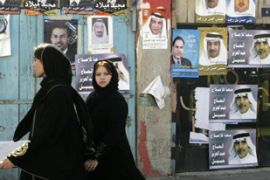Sunnis hold Bahrain majority
Shia opposition fails to win enough seats in second round to control parliament.

Bahrainis voted to choose the final 11 MPs on Saturday.
Shia gain
|
The success of the Shia opposition in a country which is home to the US Fifth Fleet comes against the background of the Shia rise to dominance in Iraq and Shia Iran’s defiance of Western demands over its nuclear ambitions |
Results from the November 25 first round gave the INAA control of more than 40 per cent of the elected chamber – a share set to rise in the second round.
The success of the Shia opposition in a country which is home to the US Fifth Fleet comes against the background of the Shia rise to dominance in Iraq and Shia Iran’s defiance of Western demands over its nuclear ambitions.
A second round of municipal elections also took place on Saturday to pick 16 out of 40 local council members.
Sheikh Ali Salman, the INAA’s charismatic leader who led the group’s ticket, told AFP that all INAA candidates were expected to win in the second round.
“If this doesn’t happen, it will be because of fraud,” he said after the first round.
Sharing power
None of the 16 women among the 206 candidates made it to the second round, but women are guaranteed a seat in the house which has gone to Latifa al-Qouhoud, who stood unopposed in her constituency, making her the first woman MP in Bahrain’s history.
The elected chamber will have to coexist with an upper chamber appointed by King Hamad, and share its legislative powers, an arrangement which prompted the opposition to boycott the 2002 polls, which were the first since the elected parliament was scrapped in 1975.
Opposition groups continue to object to the legislative powers granted to the appointed consultative council, which also has 40 members.